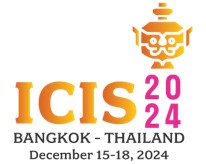| 2024 | ||
| Sunday, December 15th | ||
|---|---|---|
|
AI and Freelancers: Has the Inflection Point Arrived? Dandan Qiao, National University of Singapore
|
||
| 12:00 AM |
AI and Human Creativity on Content Creation: Analyzing Watermark and Detection Policies Zhenhua Wu, School of Business, Nanjing University
|
|
| 12:00 AM |
Dongyeob Kim, Case Western Reserve University
|
|
| 12:00 AM |
AI as a Force for Good: Promoting Diversity and Inclusion in Tech Najmeh Hafezieh, Royal Holloway University of London
|
|
| 12:00 AM |
Algorithm Aversion to Generative Artificial Intelligence in Creative Content Xiaoyu Zhang, University of Auckland
|
|
| 12:00 AM |
Artificial Intelligence Adoption and Innovation Performance: Curvilinear Impacts and Contingencies Yang (Eric) Zhou, University of Science and Technology of China
|
|
| 12:00 AM |
Lucas Memmert, Universität Hamburg
|
|
| 12:00 AM |
Imke Grashoff, University of Hamburg
|
|
| 12:00 AM |
Choose Wisely: Leveraging Explainable AI to Support Reflective Decision-Making Maximilian Förster, University of Ulm
|
|
| 12:00 AM |
Cognitive Load Dynamics in Generative AI-Assistance: A NeuroIS Study Thimo Schulz, Karlsruhe Institute of Technology
|
|
| 12:00 AM |
Designing Human-AI Hybrids: Challenges and Good Practices from a Multiple Case Study Valentin Mayer, FIM Research Center, University of Bayreuth
|
|
| 12:00 AM |
Detection of AI Hallucinations: The Impact of Information Characteristics Yanda Tao, McGill University
|
|
| 12:00 AM |
Evaluating Embedding Models for Retrieving ESG Information from Annual Business Reports Fabian Winkel, Universität der Bundeswehr München
|
|
| 12:00 AM |
Evaluation of Stereotypical Biases in Recent GPT Models Sofia Ines Stephens Fracassi, HWR Berlin
|
|
| 12:00 AM |
EXPLORE: A Novel Method for Local Explanations Bernd Heinrich, University of Regensburg
|
|
| 12:00 AM |
GenAI-ing Ideas? Understanding Human-IS Collaboration for Creative Problem Solving Divya Dwivedi, Indian Institute of Management Bangalore
|
|
| 12:00 AM |
Charlotte Knickrehm, Ruhr-Universität Bochum
|
|
| 12:00 AM |
GPT-doctor: Customizing Large Language Models for Medical Consultation Wen Wang, University of Maryland, College Park
|
|
| 12:00 AM |
Investigating the Effects of Cognitive Biases in Prompts on Large Language Model Outputs Yan Sun, National University of Singapore
|
|
| 12:00 AM |
Large Language Models for Listwise Talent Recommendation Silin Du, Tsinghua University
|
|
| 12:00 AM |
Losing Control! The Role of Sense of Agency in Using Highly Invasive AI Systems Nikola Finze, Neu-Ulm University of Applied Sciences
|
|
| 12:00 AM |
Machine-Human Collaboration and Business Agility: Impact on Performance Jessica Braojos, University of Granada
|
|
| 12:00 AM |
Making Sense of Large Language Model-Based AI Agents Andreas Göldi, University of St.Gallen
|
|
| 12:00 AM |
Mette Strange Noesgaard, Aalborg University
|
|
| 12:00 AM |
My Fault, Not AI’s Fault. Self-serving Bias Impacts Employees’ Attribution of AI Accountability Guangyu Du, Karlsruhe Institute of Technology
|
|
| 12:00 AM |
Naive Algorithmic Collusion: When Do Bandit Learners Cooperate and When Do They Compete? Connor Douglas, NYU Stern School of Business
|
|
| 12:00 AM |
Risk-Sensitive Counterfactual Explanations for AI Model Predictions Amir Asrzad, University of Massachusetts Lowell
|
|
| 12:00 AM |
Semantic Priming via Knowledge graphs to analyze and treat language model’s Honest Lies Cicy Kuriakose Agnes, German Research Centre for Artificial Intelligence (DFKI)
|
|
| 12:00 AM |
Steering Towards AI: Examining the Influence of Diverse CEO Experiences on AI Orientation Sebastian Esch, RWTH Aachen University
|
|
| 12:00 AM |
The Development and Leverage of Artificial Intelligence Capabilities Belinda Yichen Wang, The University of Sydney
|
|
| 12:00 AM |
Charles Ayoubi, Harvard
|
|
| 12:00 AM |
Unlocking the Potential of Generative Artificial Intelligence: A Case Study in Software Development Mei Wu-Gehbauer, University of Cologne
|
|
| 12:00 AM |
Theresa S. Bockelmann, University of Hamburg
|
|
Track Co-Chairs
Anjana Susarla, Ph.D., Michigan State University
Michael Chau, Ph.D., The University of Hong Kong
Oliver Hinz, Ph.D., Goethe Universitat


